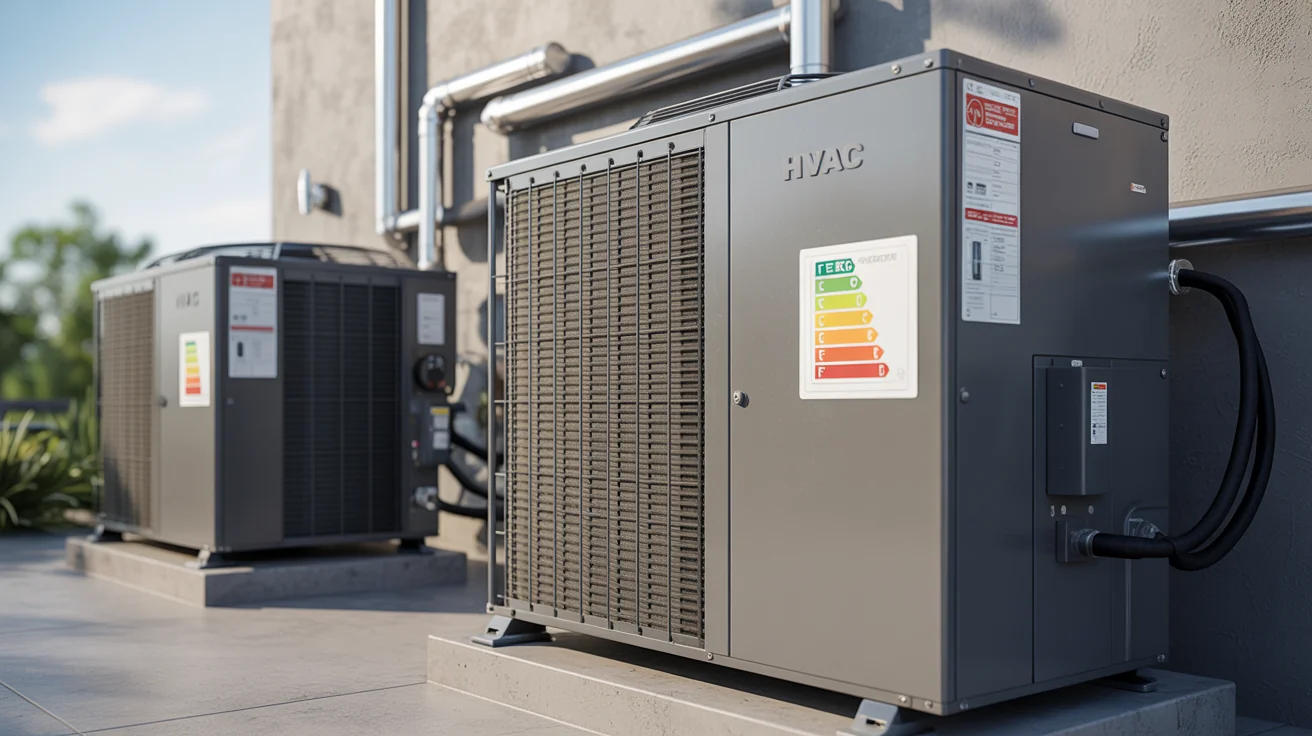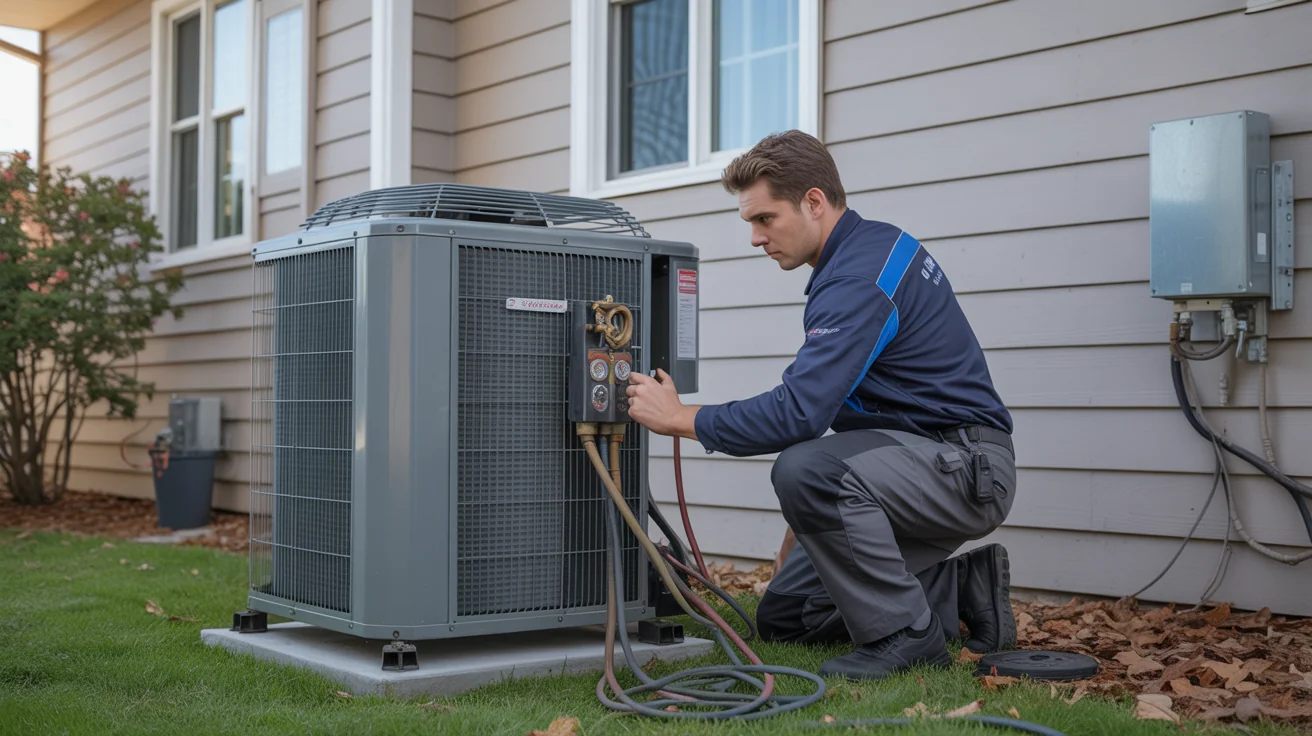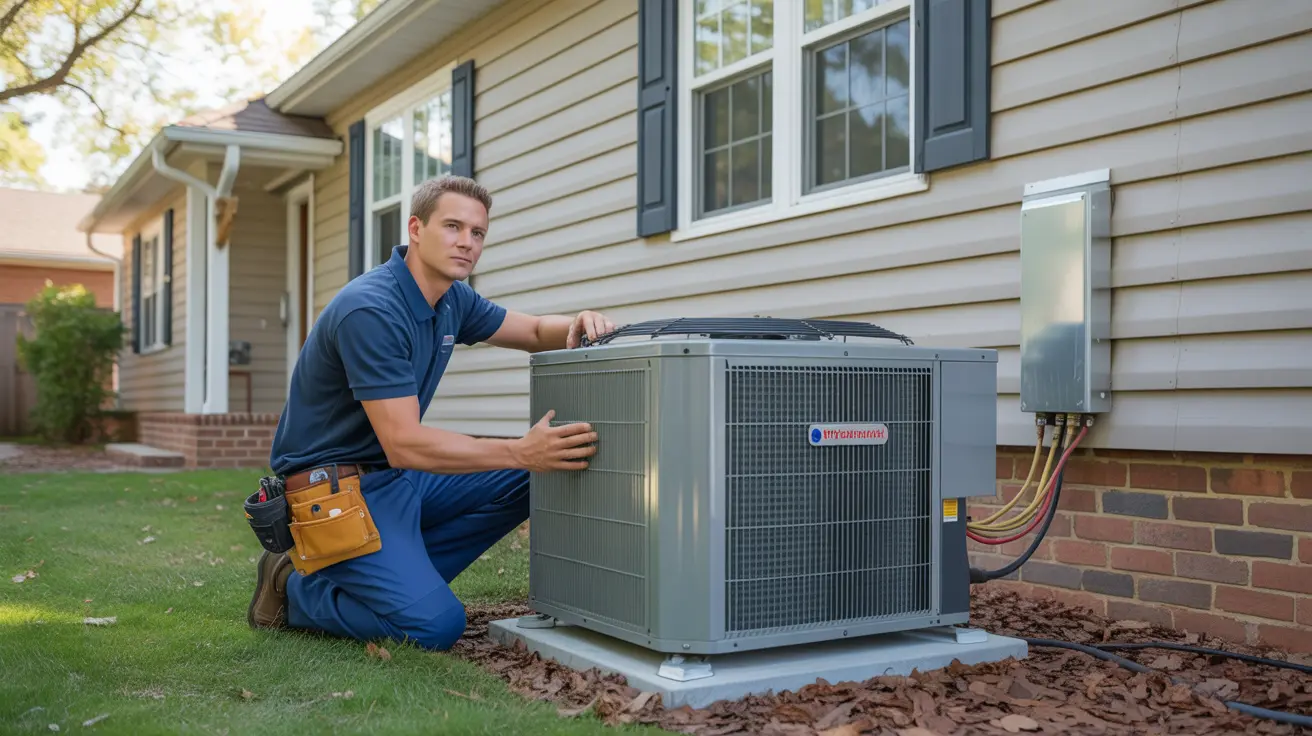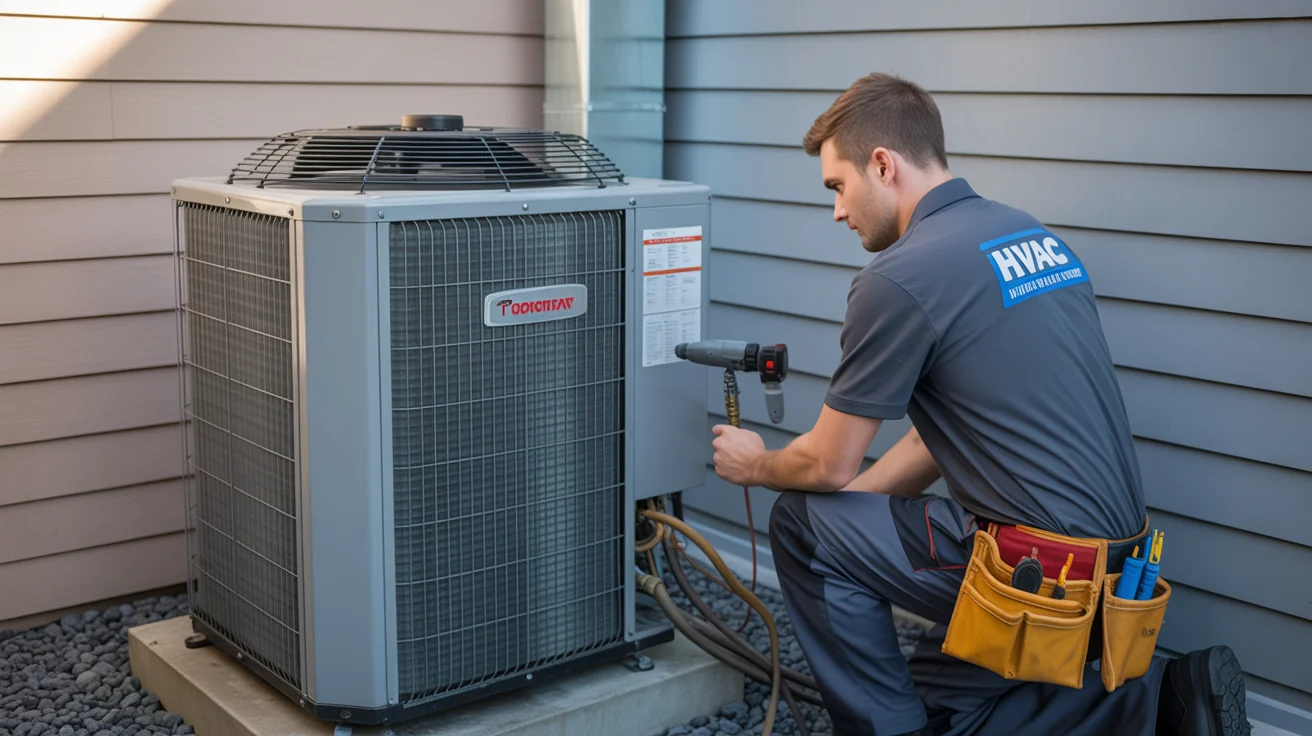HVAC Contractor Selection: Best Practices
Complete guide to selecting the best HVAC contractors in North Texas. Expert advice on evaluating contractors, avoiding scams, and ensuring quality service across the DFW metroplex.

- Picking the Right HVAC Contractor (It’s Harder Than You Think)
- North Texas Contractor Market Characteristics
- Professional Contractor Qualification Criteria
- Business Credentials and Financial Stability
- Contractor Evaluation Process
- The Scammer’s Playbook (And How to Shut It Down)
- How Bad Contractors Hook Their Victims
- Technical Red Flags That Separate Pros from Pretenders
+ 19 more sections below...
- Picking the Right HVAC Contractor (It’s Harder Than You Think)
- North Texas Contractor Market Characteristics
- Professional Contractor Qualification Criteria
- Business Credentials and Financial Stability
- Contractor Evaluation Process
- The Scammer’s Playbook (And How to Shut It Down)
- How Bad Contractors Hook Their Victims
- Technical Red Flags That Separate Pros from Pretenders
+ 19 more sections below...
Verify any North Texas HVAC contractor by checking their TACL license at TDLR.texas.gov, requesting proof of $1M+ liability insurance and workers’ compensation, and getting at least 3 written estimates with itemized equipment model numbers. The right contractor improves system efficiency 20-30%, extends equipment life 5-8 years, and prevents 70% of service problems; poor selection often results in $4,000+ rework bills within months. Red flags: door-to-door solicitors, unusually low quotes (300-500% price variations exist), cash-only requests, pressure for same-day decisions, and contractors who can’t provide their license number immediately.
Picking the Right HVAC Contractor (It’s Harder Than You Think)
After 15 years in this business, I’ve seen what happens when homeowners pick the wrong contractor. Last month, I had to completely redo a system installation in Plano because the previous contractor cut so many corners the homeowner was facing a $4,000 repair bill just six months after the initial install.
The DFW area has over 2,500 HVAC contractors, and honestly, the quality varies wildly. You’ve got guys working out of pickup trucks with no license, and you’ve got solid companies that have been serving North Texas families for decades. The problem is, they all sound the same in their ads.
So how do you separate the good from the bad? I’m going to walk you through exactly what to look for - the questions to ask, the red flags to avoid, and how to find contractors who’ll actually stand behind their work.
Contractor selection impact: The right contractor can improve system efficiency by 20-30%, extend equipment life by 5-8 years, and prevent 70% of service problems, while poor contractor selection often results in system failures, safety issues, and costly rework.
This complete guide provides professional criteria, evaluation methods, and best practices for selecting qualified HVAC contractors throughout North Texas.
North Texas Contractor Market Characteristics
Market Complexity Factors: High contractor density creates choice overload with over 2,500 licensed contractors across the region. Quality variation shows dramatic differences in service quality, expertise, and professionalism among contractors. Specialization diversity ranges from general HVAC contractors to climate-specific specialists. Service area variations affect geographic coverage and response time capabilities. Pricing disparities create 300-500% price variations between contractors for identical work.
Regional Service Challenges: Extreme climate expertise requires contractors to understand North Texas climate demands and system stresses. Municipal code knowledge encompasses multiple city codes requiring specialized compliance knowledge. Emergency response capacity becomes critical for summer cooling and winter heating emergency service. Insurance and storm damage experience handles weather-related equipment damage and insurance claims. Utility program expertise includes knowledge of rebates, incentives, and demand response programs.
Professional Contractor Qualification Criteria
Essential Licensing and Certification Requirements
Texas State Requirements:
Mandatory Contractor Qualifications:
- TACLA (Texas Air Conditioning Contractors License Association) License
- Current license status verification through TDLR (Texas Department of Licensing and Regulation)
- EPA Universal Refrigerant Certification for all technicians
- Business license and registration in service municipalities
- Current liability insurance and workers' compensation coverageAdvanced Professional Certifications: NATE (North American Technician Excellence) provides industry-recognized competency certification. Manufacturer certifications establish authorized dealer/installer status for major equipment brands. Specialty certifications cover heat pump expertise, smart controls, and indoor air quality systems. Continuing education ensures ongoing training and certification maintenance. Safety certifications include OSHA safety training and electrical/gas appliance certification.
Business Credentials and Financial Stability
Business Verification Requirements: Business registration requires verified registration with Secretary of State. Local business presence includes established local address and business operations. Financial stability demonstrates bonding capacity and financial references availability. Professional associations include BBB membership and trade association participation. Business longevity shows established track record of successful operations.
Insurance and Bonding Verification:
Insurance Requirements Verification:
- General liability insurance: $1M minimum coverage
- Workers' compensation: Current coverage for all employees
- Bonding capacity: Ability to bond large projects when required
- Vehicle insurance: Commercial vehicle coverage for service fleet
- Professional liability: Errors and omissions coverageContractor Evaluation Process
Phase 1: Initial Screening and Research (2-4 hours)
Online Research and Verification:
1. License and Credential Verification TACLA license lookup verifies current licensing status through TDLR website. BBB rating verification checks Better Business Bureau ratings and complaint history. Online review analysis evaluates Google, Yelp, and industry-specific reviews. Municipal license verification confirms licensing in service municipalities. Insurance verification requests current insurance certificates.
For step-by-step instructions on verifying contractor credentials, including how to check TDLR licenses and what certifications to look for, see our Verify Your HVAC Contractor Guide.
2. Business Background Research Company website evaluation assesses professional presentation and service information. Service area verification confirms service coverage for your location. Emergency service availability verifies 24/7 emergency service capabilities. Specialization assessment evaluates expertise in your specific HVAC needs. Professional association membership verifies trade organization participation.
Phase 2: Contractor Interview and Assessment (1-2 hours per contractor)
Professional Interview Process:
1. Technical Competency Assessment
Technical Knowledge Evaluation:
- North Texas climate expertise and system recommendations
- [Load calculation](/blog/hvac-load-calculation-methods-north-texas/) procedures and proper equipment sizing
- [Energy efficiency](/blog/energy-efficient-hvac-systems-north-texas/) knowledge and utility program familiarity
- Code compliance understanding for your municipality
- [Indoor air quality](/services/indoor-air-quality/) and advanced system knowledge2. Service and Communication Evaluation Response time measures how quickly contractor responds to inquiries. Communication quality involves clear, professional communication and explanations. Estimate process includes thorough evaluation and detailed written estimates. Timeline reliability demonstrates realistic scheduling and commitment to timelines. Customer service orientation focuses on customer satisfaction and service quality.
3. Business Practices Assessment Estimate procedures provide free estimates with detailed written proposals. Contract terms offer clear contracts with scope, timeline, and warranty information. Payment policies establish reasonable payment terms and financing options. Warranty offerings include comprehensive warranties on equipment and installation. Guarantee policies cover satisfaction guarantees and callback policies.
Phase 3: Reference and Reputation Verification (2-3 hours)
Comprehensive Reference Check:
1. Customer References Recent customer contacts provide at least 3-5 recent customer references. Project similarity offers references for projects similar to yours. Follow-up satisfaction includes long-term customer satisfaction verification. Problem resolution shows how contractor handles problems and complaints. Repeat business indicates customer willingness to use contractor again.
2. Professional References
Professional Reference Verification:
- Supplier relationships: Standing with equipment distributors
- Inspector relationships: Reputation with local building inspectors
- Manufacturer relationships: Authorized dealer status verification
- Peer recognition: Industry recognition and professional reputation
- Award and recognition: Industry awards and achievement recognitionThe Scammer’s Playbook (And How to Shut It Down)
How Bad Contractors Hook Their Victims
I’ve seen every trick in the book, and they all follow the same pattern:
The door-knocker: “I was just working on your neighbor’s house and noticed your AC unit looks like it’s having problems.” Translation: I’m trolling neighborhoods looking for easy marks.
The pressure cooker: “This price is only good if you sign today.” Real contractors give you time to think. Scammers know you won’t choose them if you have time to research.
The lowball artist: A quote that’s thousands below everyone else. They’ll either do terrible work, add charges later, or disappear with your deposit.
The cash man: “I can save you the tax if you pay cash.” They’re not saving you money - they’re evading taxes and leaving you with no recourse when things go wrong.
How to spot the paperwork problems: Handwritten estimates on notebook paper (professionals use software and printed forms). Contracts missing basic info like license numbers, start dates, or equipment specs. No warranty information or “warranties available for extra cost”. Payment plans that front-load their money (legitimate contractors get most payment at completion). Missing permit information (they’re planning to work illegally).
Here’s my test: Ask for their TACL license number and say you’ll look it up online. Watch their reaction. A legitimate contractor will immediately give it to you. A scammer will make excuses.
Technical Red Flags That Separate Pros from Pretenders
When they show up to give you an estimate, watch for these warning signs:
They don’t measure anything. Professional contractors spend time measuring your house, checking insulation, looking at ductwork. If they glance at your old unit and say “I can replace this with the same size,” they’re guessing.
They can’t explain the technical stuff. Ask them about SEER ratings, load calculations, or refrigerant types. If they get vague or change the subject, they don’t know what they’re doing.
They’ve never heard of local codes. Every city in North Texas has specific HVAC requirements. A contractor who doesn’t know Frisco’s permit process or Plano’s efficiency requirements isn’t doing much local work.
They don’t mention efficiency or rebates. Professional contractors know about utility rebates, tax credits, and efficiency programs. If they’re not bringing up ways to save you money, they’re not staying current.
They bad-mouth other contractors. I’ve never heard a good contractor trash-talk the competition. Good contractors are confident in their own work.
They can’t provide manufacturer certifications. Major equipment manufacturers train and certify their dealers. If they’re not certified with the brands they sell, they’re not getting proper support or training.
The biggest red flag: They answer every question with “Don’t worry about it, we’ll handle everything.” Professional contractors want educated customers. They explain things, show you options, and help you make informed decisions.
Quality Contractor Identification
Characteristics of Professional Contractors
Professional Service Indicators: Thorough evaluation process: comprehensive home assessment and load calculations. Detailed written estimates: complete proposals with equipment specs and installation details. Professional presentation: clean uniforms, marked vehicles, and professional materials. Current technology use: modern diagnostic equipment and estimation tools. Ongoing education: current certifications and continuing education participation.
Customer Service Excellence:
Professional Service Standards:
- Prompt, professional response to inquiries and service calls
- Clear communication and explanation of recommendations
- Respect for customer property and cleanup after work
- Follow-up service to make sure customer satisfaction
- Warranty support and ongoing service availabilityNorth Texas Regional Expertise Requirements
Climate-Specific Knowledge: Heat pump expertise: understanding of heat pump benefits for north texas climate. Dual-fuel system knowledge: integration of heat pumps with gas furnace backup. Storm damage assessment: experience with weather-related equipment damage and repair. Peak demand management: understanding of utility demand response programs. Indoor air quality focus: knowledge of iaq solutions for north texas allergen challenges.
Local Market Expertise: Municipal code knowledge: current understanding of local code needs. Utility program familiarity: knowledge of available rebates and incentive programs. Service area coverage: reliable service throughout assigned coverage area. Emergency response capability: 24/7 availability during extreme weather events. Insurance claim experience: working with insurance companies on weather damage claims.
Contractor Selection Best Practices
Systematic Evaluation Process
Multi-Contractor Comparison: Always evaluate at least 3-4 qualified contractors to make sure complete comparison.
Evaluation Criteria Weighting:
Contractor Selection Priority Matrix:
1. Licensing and credentials (25%): Essential qualifications and certifications
2. Technical competency (20%): Knowledge and expertise in HVAC systems
3. Business reputation (20%): Customer references and professional standing
4. Service quality (15%): Communication, professionalism, and customer service
5. Pricing competitiveness (10%): Fair pricing within market standards
6. Warranty and guarantees (10%): Protection and ongoing supportDocumentation and Comparison: Standardized evaluation: use consistent criteria for all contractor evaluations. Written documentation: document all interactions, estimates, and evaluations. Comparison matrix: create side-by-side comparison of qualified contractors. Decision timeline: allow adequate time for thorough evaluation process. Final verification: re-check credentials and references before final selection.
Contract and Agreement Best Practices
Contract Essential Elements: Detailed scope of work: complete description of all work to be performed. Equipment specs: exact model numbers, efficiency ratings, and warranty information. Timeline and schedule: start date, completion timeline, and milestone schedule. Total cost breakdown: itemized costs for equipment, labor, permits, and additional services. Warranty terms: equipment and installation warranties with specific terms and coverage.
Payment Protection:
Safe Payment Practices:
- Small down payment: Maximum 10% down payment for materials
- Progress payments: Payments tied to work completion milestones
- Final payment: Retain 10% until final inspection and satisfaction
- Payment methods: Check or credit card payments (avoid cash)
- Lien waivers: Obtain lien waivers for all progress paymentsRegional Contractor Specialization Areas
Dallas-Fort Worth Metro Contractors
Urban Specialization Requirements: High-rise and multi-story experience: commercial and large residential systems. Noise ordinance compliance: equipment selection and installation for noise control. Space constraint expertise: installation in limited space urban environments. Air quality specialization: enhanced indoor air quality solutions for urban pollution. Emergency response capacity: rapid response capability for urban emergency service.
Suburban North Texas Contractors
Suburban Service Expertise: Large residential systems: experience with large homes and complex zoning systems. New construction specialization: working with builders and new home installations. Homeowner association compliance: understanding hoa needs and approval processes. Utility program expertise: maximizing rebates and incentive programs for homeowners. Landscape integration: coordinating equipment placement with landscape design.
Rural and Semi-Rural Contractors
Rural Service Requirements: Extended service area coverage: willingness to travel to remote locations. Propane system expertise: installation and service of lp gas heating systems. Well water system knowledge: understanding impacts of private water systems on hvac. Septic system compatibility: knowledge of condensate disposal with septic systems. Backup power integration: experience with generator backup systems for power outages.
Service Quality and Performance Metrics
Performance Evaluation Criteria
Service Quality Metrics: Response time reliability: meeting scheduled appointment times and communication. Work quality standards: installation and service quality meeting professional standards. Problem resolution effectiveness: ability to diagnose and resolve hvac problems. Customer satisfaction rates: high customer satisfaction and repeat business rates. Warranty compliance: honoring warranties and standing behind work performed.
Long-term Performance Indicators:
Contractor Performance Evaluation:
- Equipment performance: Systems performing as expected over time
- Service call frequency: Minimal service needs after installation
- Energy efficiency achievement: Meeting projected efficiency improvements
- Customer retention: High repeat customer and referral rates
- Professional development: Ongoing training and certification maintenanceOngoing Contractor Relationship Management
Maintenance and Service Relationships: Annual maintenance agreements: ongoing service contracts for system maintenance. Priority service scheduling: preferential scheduling for existing customers. Performance monitoring: tracking system performance and addressing issues promptly. Upgrade and improvement consultation: ongoing advice on system improvements. Emergency service priority: priority response during emergencies and peak seasons.
Cost Considerations and Value Analysis
Understanding Contractor Pricing
Pricing Structure Analysis: Equipment costs: wholesale equipment costs plus reasonable markup. Labor rates: competitive labor rates for skilled hvac technicians. Overhead allocation: reasonable business overhead and profit margins. Value-added services: additional services included in pricing. Warranty and service inclusion: service and warranty value included in pricing.
Value vs. Price Analysis:
Value-Based Contractor Selection:
- Total cost of ownership: Equipment cost + installation + ongoing service
- Energy efficiency value: Long-term [energy savings](/blog/seasonal-hvac-energy-saving-strategies-north-texas-year-round-guide/) from quality installation
- Reliability value: Reduced service needs and emergency calls
- Warranty value: Comprehensive warranty coverage and support
- Service value: Ongoing service relationship and supportFrequently Asked Questions
Q: How many contractors should I get estimates from? A: Get estimates from at least 3-4 qualified, licensed contractors to make sure proper comparison of pricing, services, and approaches.
Q: What credentials should I check before hiring an HVAC contractor? A: Verify TACLA licensing, EPA certification, liability insurance, workers’ compensation, local business licenses, and manufacturer certifications.
Q: How can I avoid HVAC contractor scams? A: Avoid door-to-door solicitors, high-pressure sales, unusually low prices, cash-only payments, and contractors who can’t provide proper licensing and insurance documentation.
Q: What should be included in an HVAC contractor estimate? A: Complete scope of work, equipment specs, labor costs, permit fees, timeline, warranty information, and total project cost breakdown.
Q: How important are customer references when selecting a contractor? A: Customer references are critical for checking service quality, professionalism, and problem resolution capabilities. Always contact at least 3-5 recent references.
Q: What questions should I ask potential HVAC contractors? A: Ask about licensing, insurance, experience, approach to your project, timeline, warranty, references, and emergency service availability.
Q: How do I search for a Texas air conditioning and refrigeration contractor license on TDLR? A: Visit the Texas Department of Licensing and Regulation (TDLR) website at tdlr.texas.gov and use their license search tool. Here’s how: (1) Go to tdlr.texas.gov/LicenseSearch, (2) Select “Air Conditioning and Refrigeration Contractors” from the license type dropdown, (3) Enter the contractor’s name or license number, (4) Review the results showing license status, issue date, expiration date, and any disciplinary actions. You can also call TDLR at (512) 463-6599 to verify a license by phone. Always verify the license is “Active” status, not expired or revoked. A legitimate contractor should provide their TACL (Texas Air Conditioning License) number without hesitation—if they can’t, that’s a major red flag.
Q: How do I find licensed HVAC professionals for residential service? A: To find licensed HVAC professionals in Texas: (1) Use the TDLR license search at tdlr.texas.gov to verify any contractor you’re considering, (2) Ask for their TACL license number upfront—legitimate contractors provide it immediately, (3) Check for NATE certification (North American Technician Excellence) for individual technicians, (4) Verify manufacturer certifications for your specific equipment brand, (5) Confirm current liability insurance ($1M minimum) and workers’ compensation coverage. Beyond licensing, look for contractors with established local presence, positive reviews on Google and BBB, and willingness to provide references from recent jobs in your area.
Q: How do I file a complaint against an HVAC contractor in Texas? A: If an HVAC contractor has done substandard work, abandoned a job, or operated without a license, you have several options:
File with TDLR (Texas Department of Licensing and Regulation):
- Go to tdlr.texas.gov/complaints or call (800) 803-9202
- Submit your complaint online with documentation (photos, invoices, contracts)
- TDLR investigates licensed contractor violations and can impose fines, require restitution, or revoke licenses
- Complaints must be filed within 2 years of the incident
Additional complaint resources:
- Better Business Bureau (BBB): File at bbb.org - creates public record and may trigger mediation
- Texas Attorney General Consumer Protection: Call (800) 621-0508 or file at texasattorneygeneral.gov for fraud or deceptive practices
- Local building department: Report unpermitted work or code violations
- Small claims court: Sue for damages up to $20,000 in Texas without an attorney
Tips for effective complaints:
- Document everything with dated photos and written records
- Keep all contracts, invoices, and correspondence
- Get a written assessment from another licensed contractor showing the deficient work
- File complaints promptly—waiting reduces your options
Don’t Gamble With Your Comfort and Safety
After fifteen years of seeing contractor disasters and fixing other people’s mistakes, here’s what I can promise you:
When you call (940) 390-5676, you get a real HVAC professional:
- Licensed in Texas since 2008 (TACL license #TACLB55045E - look it up)
- Fully insured with certificates I’m happy to provide
- Manufacturer-trained and certified on all major brands
- References from hundreds of satisfied North Texas customers
I don’t work out of my truck. I don’t knock on doors. I don’t pressure anyone to sign today. I show up on time, do the work right, and stand behind it with real warranties.
Most importantly: I’ll tell you the truth. If your system can be repaired, I’ll tell you. If you need a replacement, I’ll explain exactly why and give you options at different price points. You’ll never wonder if you’re being sold something you don’t need.
Schedule a free consultation and see the difference: jupitairhvac.com/contact
Why Customers Choose Us (And Keep Referring Their Neighbors)
I’ve built my business on referrals because I do things the right way: Proper licensing and insurance - i’m not cutting corners on credentials. Professional installations that pass inspection the first time. Fair pricing with written estimates that mean what they say. Real warranties that i actually honor when you need service.
You shouldn’t have to become an HVAC expert to get honest service. That’s my job.
Professional HVAC service shouldn’t be this hard to find, but apparently it is. When you work with Jupitair HVAC, you get what every homeowner deserves: honest answers, quality work, and fair prices.
Jupitair HVAC - North Texas HVAC professionals since 2008. Licensed, insured, and recommended by customers who know the difference.
Sources & References
The contractor licensing requirements and professional standards in this article are based on the following authoritative sources:
- Texas Department of Licensing and Regulation - HVAC - State licensing requirements and verification
- Better Business Bureau - Business rating and complaint information
- ACCA - Quality Installation - Industry installation standards
- NATE Certification - Technician certification verification
- EPA Section 608 - Refrigerant handling certification requirements
- Texas Secretary of State - Business registration verification
- U.S. Department of Energy - HVAC - Efficiency standards
Last Updated: January 2026
Need Professional HVAC Service?
Our certified technicians are ready to help with any HVAC needs in North Texas




